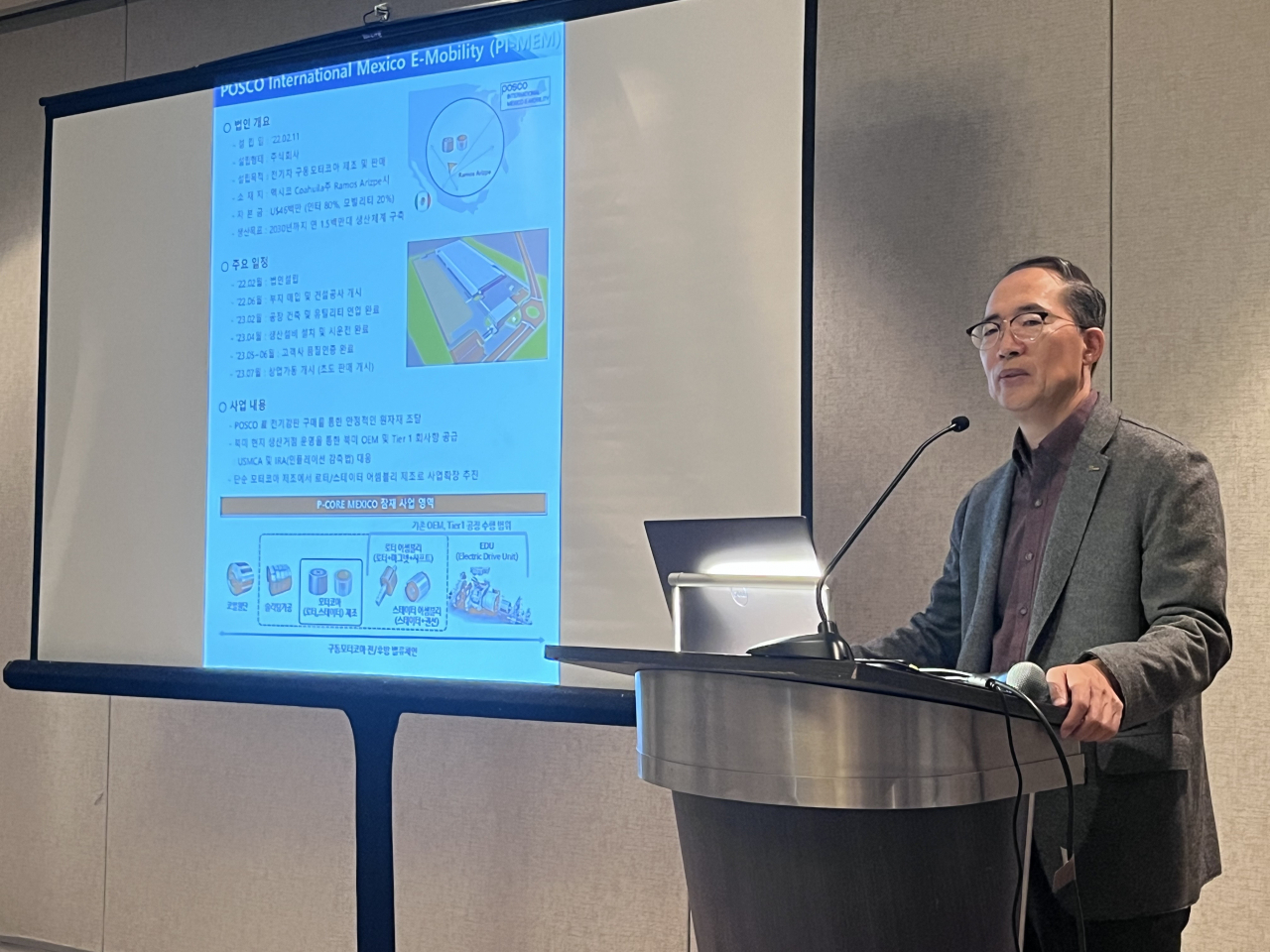Posco outlines vision for battery value chain in North America
By Kim Da-solPublished : Dec. 21, 2022 - 17:47

ATLANTA – Posco Group has unveiled its ambitious vision to become the most coveted company when it comes to battery materials, a burgeoning industry riding high on the electric push among global carmakers.
“The world’s renowned electric vehicle manufacturers have been contacting Posco in recent years,” said Posco America Representative President Do Han-eui during a press conference in Atlanta on Dec. 10.
Highlighting the group’s second battery material business value chain, Do said that the group will directly target the North American EV market by supplying core materials like cathode and anode materials.
Earlier this year, Posco Chemical set up a joint venture with General Motors called Ultium CAM. CAM refers to cathode-active materials.
Under the $327 million joint venture with Posco Chemical owning 85 percent, the two companies will build a plant with an annual capacity of 30,000 metric tons of material in the Canadian province of Quebec. Construction of the production plant kicked off in August, targeting for completion in the second half of 2024.
“Our Ultium CAM joint venture plans to produce thousands of tons of material annually, primarily going to GM’s Ultium Cells, a GM-LG Energy Solutions joint venture which will use Posco’s materials at their plants throughout the US,” Posco Chemical Canada President Cha Chi-gyu told reporters.
“The Inflation Reduction Act has made Posco Group the most coveted firm in terms of securing the battery material. We are currently in contact with other automotive manufacturers and battery makers in the US,” Cha added, referring to a US bill that gives consumer subsidies exclusively to EVs produced in North America.
By 2030, Posco forecasts it will have a production capacity of around 610,000 tons for cathode-active materials, 322,000 tons for anode materials, 300,000 tons for lithium and 220,000 tons for nickel to achieve 41 trillion won ($32 billion) in revenue from the secondary battery material business.
This will pull up the portion of its sales related to eco-friendly business from last year’s 1 percent to 40 percent by 2030.
To this end, Posco has been heavily investing in its global EV supply chain in the last few years, including a number of plants for EV battery components and materials under construction worldwide.
Not only does it process and supply nickel and graphite, but the firm also has utilized lithium extraction technology at major locations including South America for extracting lithium from rocks or salt lakes.
“As Argentina has a higher concentration of lithium in saltwater compared to neighboring South American countries like Bolivia and Chile, global firms have been flocking to the region in recent years,” said Posco Argentina President Kim Kwang-bok, adding that Posco Argentina has gotten a head start in extracting lithium from lakes at higher yields compared to its rivals.
Highlighting the group’s environmental, social and governance efforts, Kim underlined that the lithium business in Argentina will help the group use less water and energy by opting for eco-friendly methods such as natural evaporation or eco-friendly power sources.
Posco is aiming for an annual lithium production capacity of 300,000 tons by 2030, including some 100,000 tons from Argentina.
Posco expects to see at least 109 trillion won in cumulative revenue from its lithium commercialization plant at a salt lake in Argentina, considering the site’s potential for excavating 2.8 million tons of lithium carbonate.
Meanwhile, Posco Group is also going all-out to manufacture core EV parts on its own.
In July, Posco International kicked off the construction of a new plant manufacturing automotive motor cores in Coahuila, Mexico, to meet the growing demand for EV parts in the North American market.
With construction expected to be completed early next year, the company expects the Mexican plant to be a bridge that strengthens penetration into the North American EV parts market.
“Since our plan for construction was announced, we have already received requests from various automotive firms for quotations,” Ko Young-hak, managing director at Posco Mexico E-Mobility, told reporters.
By Kim Da-sol, Korea Herald Correspondent (ddd@heraldcorp.com)




![[Herald Interview] 'Amid aging population, Korea to invite more young professionals from overseas'](http://res.heraldm.com/phpwas/restmb_idxmake.php?idx=644&simg=/content/image/2024/04/24/20240424050844_0.jpg&u=20240424200058)












![[KH Explains] Korean shipbuilding stocks rally: Real growth or bubble?](http://res.heraldm.com/phpwas/restmb_idxmake.php?idx=652&simg=/content/image/2024/04/25/20240425050656_0.jpg&u=)

